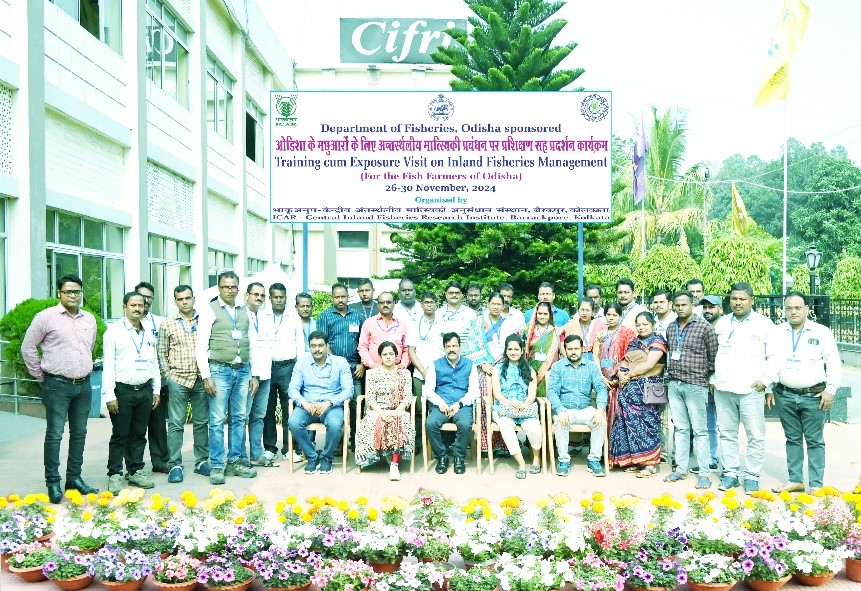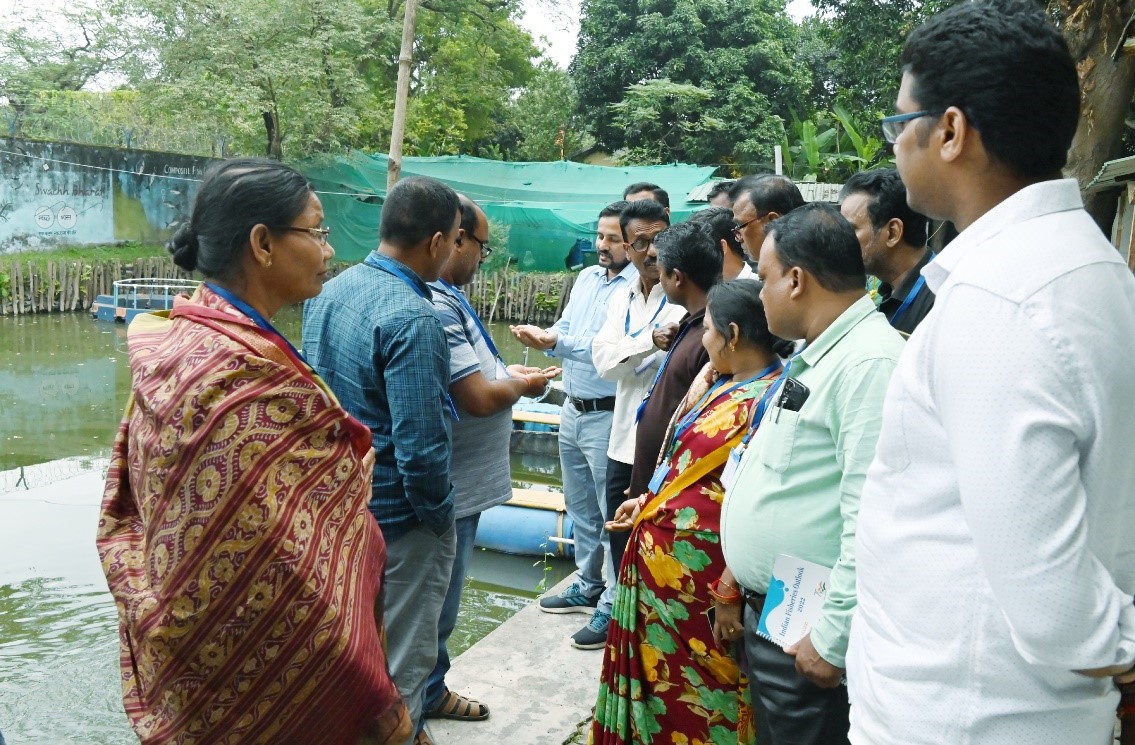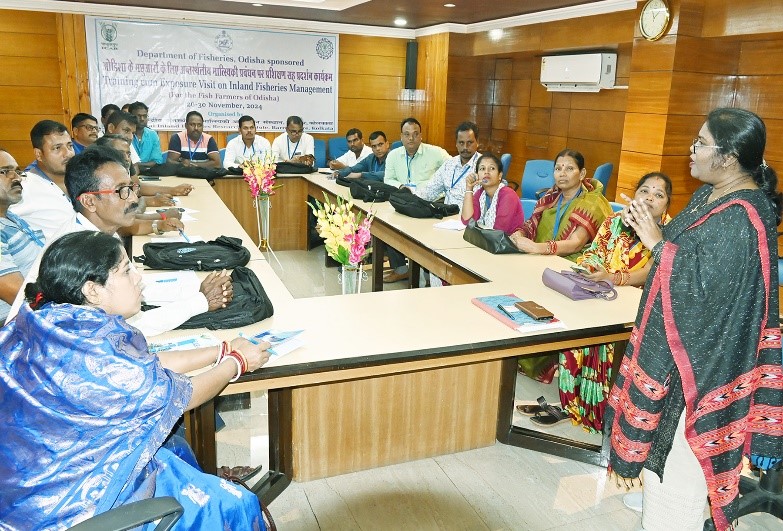Overview
Publications
Recruitment
Intranet
CIFRI Corners'
 Cuttack, the commercial capital of Odisha, is home to numerous trading and business houses. The districts of Cuttack, Kendrapara, and the Bay of Bengal encircle the district of Jagatsinghpur. A project to modernize and upgrade the fishing harbor at Paradip in Jagatsinghpur was recently inaugurated. Over the past three to four years, the demand for local fish has grown in both urban and rural markets, as fish farming has become a feasible and profitable choice. Numerous rivers and tributaries flow through these districts, providing ample opportunities for fish farming.
Cuttack, the commercial capital of Odisha, is home to numerous trading and business houses. The districts of Cuttack, Kendrapara, and the Bay of Bengal encircle the district of Jagatsinghpur. A project to modernize and upgrade the fishing harbor at Paradip in Jagatsinghpur was recently inaugurated. Over the past three to four years, the demand for local fish has grown in both urban and rural markets, as fish farming has become a feasible and profitable choice. Numerous rivers and tributaries flow through these districts, providing ample opportunities for fish farming.From November 26 to 30, 2024, fish farmers from the districts of Cuttack, Jagatsinghpur, and Kendrapara in Odisha participated in a five-day training and exposure visit program on "Inland Fisheries Management" considering their potential water resources.
 Sponsored by the Odisha state fishery department, the program aimed to enhance the skills and knowledge of rural farming communities. The training program was attended by thirty-two fish farmers, including two assistant fisheries officers (AFO), who learned how to increase the profitability of fish culture, maintain livelihoods, and optimize output.Dr. B.K.Das, Director of ICAR-CIFRI launched the program. In his inaugural speech, he emphasized the need for fishermen to gain a better grasp of inland fisheries management in order to ensure their sustainable means of livelihood. Better livelihoods could result from the expansion of inland aquaculture in these three Odisha districts. Through this training program,
Sponsored by the Odisha state fishery department, the program aimed to enhance the skills and knowledge of rural farming communities. The training program was attended by thirty-two fish farmers, including two assistant fisheries officers (AFO), who learned how to increase the profitability of fish culture, maintain livelihoods, and optimize output.Dr. B.K.Das, Director of ICAR-CIFRI launched the program. In his inaugural speech, he emphasized the need for fishermen to gain a better grasp of inland fisheries management in order to ensure their sustainable means of livelihood. Better livelihoods could result from the expansion of inland aquaculture in these three Odisha districts. Through this training program, ICAR-CIFRI sought to close the knowledge, skill, and viewpoint gaps among farmers about the management of inland fisheries.Pond construction and management, water quality management, nurseries and rearing ponds management, composite fish culture, natural fish food organisms in inland open waters, induced fish breeding and hatchery management, fish disease management, fish feed management, socio-economic and governance pattern in inland fisheries sector, economic evaluation of fisheries enterprise, participatory problem identification for improving fish production in Odisha, etc. were some of the aspects of the fisheries sector
ICAR-CIFRI sought to close the knowledge, skill, and viewpoint gaps among farmers about the management of inland fisheries.Pond construction and management, water quality management, nurseries and rearing ponds management, composite fish culture, natural fish food organisms in inland open waters, induced fish breeding and hatchery management, fish disease management, fish feed management, socio-economic and governance pattern in inland fisheries sector, economic evaluation of fisheries enterprise, participatory problem identification for improving fish production in Odisha, etc. were some of the aspects of the fisheries sector that were covered in the course. As part of their field exposure visits, the trainees visited the Halisahar fish farm and the East Kolkata wetland. They were exposed to the Institute's Recirculatory Aquaculture System (RAS), Bio-floc units, ornamental hatchery units, and feed mill in addition to receiving practical training in a wide range of need-based subjects, including basic water quality parameters, making fish feed with locally sourced ingredients, identifying fish pathogens and the proper remedies, etc. The trainees' overall contentment with their newly learned cognition, which they pledged to apply to their own water resources, served as the feedback session's benchmark. The institute's director recommended in his closing remarks that the farmers use the knowledge they had acquired from this training program to combine higher outputs. Dr. Aparna Roy and Dr.D.K. Meena coordinated the program with the able support of Mr. Sujit Choudhury, Mr. Manabendra Roy, Dr. Avishek Saha, Mr. Anjon Kumar Talukder, Mr. Pankaj Kumar, and Mr. Niranjan Kumar.
that were covered in the course. As part of their field exposure visits, the trainees visited the Halisahar fish farm and the East Kolkata wetland. They were exposed to the Institute's Recirculatory Aquaculture System (RAS), Bio-floc units, ornamental hatchery units, and feed mill in addition to receiving practical training in a wide range of need-based subjects, including basic water quality parameters, making fish feed with locally sourced ingredients, identifying fish pathogens and the proper remedies, etc. The trainees' overall contentment with their newly learned cognition, which they pledged to apply to their own water resources, served as the feedback session's benchmark. The institute's director recommended in his closing remarks that the farmers use the knowledge they had acquired from this training program to combine higher outputs. Dr. Aparna Roy and Dr.D.K. Meena coordinated the program with the able support of Mr. Sujit Choudhury, Mr. Manabendra Roy, Dr. Avishek Saha, Mr. Anjon Kumar Talukder, Mr. Pankaj Kumar, and Mr. Niranjan Kumar.










